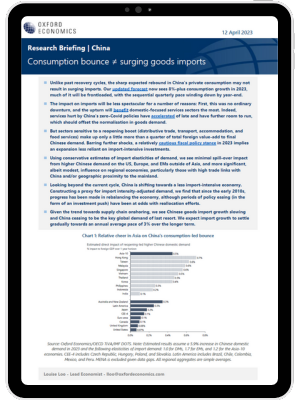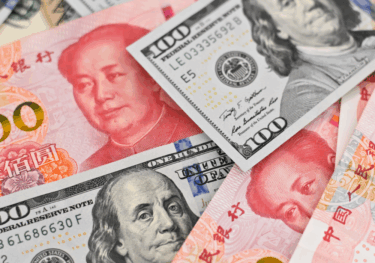China: Consumption bounce ≠ surging goods imports

Unlike past recovery cycles, the sharp expected rebound in China’s private consumption may not result in surging imports. Our updated forecast now sees 8% plus consumption growth in 2023, much of it will be frontloaded, with the sequential quarterly pace winding down by year-end.
The impact on imports will be less spectacular for a number of reasons: First, this was no ordinary downturn, and the upturn will benefit domestic-focused services sectors the most. Indeed, services hurt by China’s zero-Covid policies have accelerated of late and have further room to run, which should offset the normalisation in goods demand.
What you will learn:
- But sectors sensitive to a reopening boost (distributive trade, transport, accommodation, and food services) make up only a little more than a quarter of total foreign value-add to final Chinese demand.
- Using conservative estimates of import elasticities of demand, we see minimal spill-over impact from higher Chinese demand on the US, Europe, and EMs outside of Asia, and more significant, albeit modest, influence on regional economies, particularly those with high trade links with China and/or geographic proximity to the mainland.
- Looking beyond the current cycle, China is shifting towards a less import-intensive economy. Constructing a proxy for import intensity-adjusted demand, we find that since the early 2010s, progress has been made in rebalancing the economy, although periods of policy easing (in the form of an investment push) have been at odds with reallocation efforts.
Tags:
Related posts

Post
A reality check on the status of RMB internationalisation
The recent geopolitical shocks and abrupt US policy shifts have heightened concerns about the stability of the dollar-centric global financial system and strengthened the perceived need for diversification.
Find Out More
Post
China and AI underpin stronger global trade outlook
Global trade is set for a stronger-than-expected rebound, supported by lower US tariffs, continued AI-driven investment, and China’s renewed export push. Our latest forecasts show upgrades to both nominal and volume trade growth in 2025–26, even as legal uncertainty surrounding US tariff mechanisms and evolving geopolitical dynamics pose risks to the outlook.
Find Out More
Post
China’s Outbound Recovery: Slowing but Still Rising
Research Briefing China: Consumption bounce ≠ surging goods imports The rebound continues, but slowing demand, economic headwinds, and shifting traveler preferences are reshaping the outlook.
Find Out More